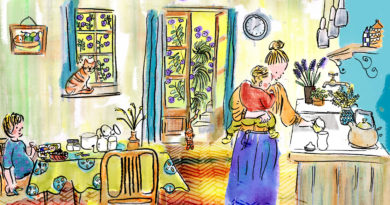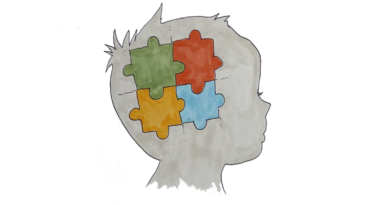Breastfeeding Ideas Trends Old and New
An article in a recent La Leche League journal with the title “New Trends in Breastfeeding” caught my attention. Was this article about the latest colours for breastfeeding accessories? Or a trend where wet nurses were returning to fashion? No, the article merely described another alternative to the still-often-used traditional cradle hold. The “trend” in that article was about technique.
In the 1970s, the WHO and UNICEF were concerned about a different trend – the trend of falling breastfeeding rates the world over and the resulting increasing rates of infant mortality. To address this negative trend, they developed the small brochure entitled “The Ten Steps to Successful Breastfeeding” and launched the global Baby Friendly Hospital Initiative in 1980. At that time, the approach reversed the downward trend. Sadly, today, a quarter of a century later, global breastfeeding rates again are a cause for concern.
Today, health professionals concentrate on providing technical information and quick-fix answers. Correct positioning and latch-on have become technical issues and the stressful recording of the amount of breast milk given per feeding through careful weighing of the baby before and after breastfeeding is becoming routine. The difficult issue of weight loss/gain while still in hospital and early supplementation with formula are creating huge, lasting problems and distress for new mothers.
We are still being told that breastfeeding is a learned behaviour. The “learned behaviour” breastfeeding theory began with obstetrician Mavis Gunther, who thought that human mothers must need instruction in breastfeeding because chimpanzees in zoos, who had never seen other chimpanzees nurse, needed to be shown how to breastfeed. Susanne Colson, the British midwife who coined the term “biological nurturing,” was unable to find any supporting evidence for this theory, and obstetrician Christina Smilie went further to assert that this sort of cognitive learning of breastfeeding actually interferes with the instinctual behaviour of mothers, possibly even to the extent that it inhibits the natural release of breastfeeding hormones and makes breastfeeding more difficult. The most important “learning” cannot come from a book of instructions, but rather from imitating competent role models. All other mammals in our world don’t seem to need instruction or breastfeeding “aids” such as swaddling blankets and nursing pillows to nurture their young.
Because breastfeeding is no longer needed for survival (after all, we have safe alternatives in places where clean water is on hand), breastfeeding has become a lifestyle choice in many cultures and an emotional issue that is debated long before the birth, taking family attitudes and worries/regrets, concerns about returning to work, and coping with misinformation and the negative attitudes toward breastfeeding that are prevalent in our society today into consideration.
Most breastfeeding mothers are very vulnerable, especially immediately postpartum, because of the hormonal upheaval following birth, and are beset with doubts as to their ability to nurture their babies. The last things they need to hear are such remarks as:
- “Is he nursing again? He just uses you as a pacifier…. let me give him a bottle and you can get on with the housework.”
- “Maybe your milk isn’t good enough. We never had enough milk in our family.”
- “Can breasts that small/large/high/… really make milk?”
- “If you are going back to work, shouldn’t he get used to being fed by others?”
- “You look like a cow attached to that pump.”
- “I feel your breasts belong to me, not to the baby.”
- “Don’t let him fall asleep at the breast, he will get into bad habits.”
Instead, they need to hear positive, supportive, reassuring comments along the lines of:
- “I bet you are tired – put your feet up and let me bring you a cup of tea.”
- “You are doing so well; do let us know what we can do best to help.”
- “You know your baby best and are certainly doing what is right for him.”
- “It’s really hard for you when everyone is telling you something different. How do you feel about breastfeeding?”
La Leche League is a worldwide organisation that endeavours to support mothers in their wish to breastfeed and publishes a wide range of well-researched breastfeeding information. It is helpful to read their book The Womanly Art of Breastfeeding, not only for breastfeeding mothers, but also for those close to such a mother, in order to learn how best to give the breastfeeding mother the support that she needs.
Our monthly LLL Meetings are open to all. Here we offer support and instil confidence in women in their abilities to care for their children and to breastfeed. If these meetings are not for you, they do not fit into your busy agenda, or you have immediate and urgent questions or concerns, we are happy to answer your telephone enquiries. LLL Switzerland Leaders are listed on our Internet pages, and they are happy to offer a listening ear, to share ideas, and to empower mothers in finding their own solutions. We look forward to hearing from you.
Submitted by Joanna Koch
Joanna has been a LLL Leader since the 1980s and has been in Switzerland since 1960. She is very happy to have eight loving grandchildren and to be part of the MM Team.
Illustration by Masha Ellis
Masha works as a product manager in the finance industry during the day and dedicates her spare time to art, cooking and her traditional nutrition blog. She is Australian with Ukranian roots and now lives near Lake Zurich with her little girl. To find out more, follow her on Facebook or visit her blog.




